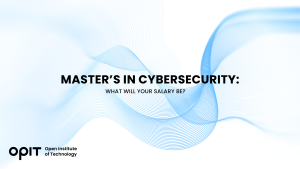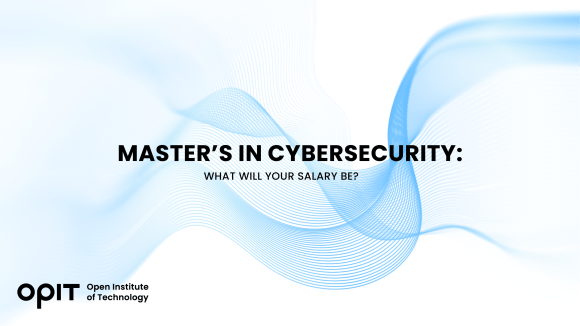

Cyberthreats keep evolving at an unprecedented rate, affecting critical digital infrastructure across industries. Worst of all? No one’s safe. Not healthcare providers, not financial institutions, and not even government agencies. That’s why it shouldn’t be surprising that the demand for cybersecurity professionals is also unprecedented, with over 347,000 positions waiting to be filled throughout Europe.
Naturally, such high demand comes with competitive salaries for highly trained and educated individuals. So, if you’re pursuing a master’s degree in cyber security, salary expectations are undoubtedly promising, often reaching six figures.
In other words, investing in a master’s degree in cyber security is investing in a financially secure future.
But just how secure will this future be? Keep reading to learn what the master’s in cybersecurity salary expectations are.
How Much Can I Make With a Master’s in Cybersecurity?
Given how desperately companies need qualified cybersecurity professionals, they do their best to make their offers as attractive as possible. That’s why the average salary for a master’s degree in cyber security is roughly €73,000 a year.
In the U.S., the situation is even better, with the average salary as high as $132,962 (around €123,000) a year. This is great news, as virtually all cybersecurity job positions can be done fully remotely.
As for a salary range, top earners make over €100,000 a year in countries like Luxembourg, Belgium, and Switzerland. Entry-level positions typically start at €30,000. This discrepancy clearly shows that years of experience play a significant role in determining the cybersecurity master’s salary. But this factor is far from the only one.
The location of the job, the specific industry (private or public sector), and the level of responsibility also heavily influence compensation in the cybersecurity field.
With these elements, the math is simple. Countries with higher demand for cybersecurity professionals (e.g., Germany) will generally offer higher salaries. The same goes for industries, such as finance and technology, which pay better than government jobs. But what about the level of responsibility? How does your cybersecurity role affect your salary?
The good news is that those who hold a master’s degree can earn a six-figure salary even if they aren’t in a leadership position. Let’s break down the average master’s in cyber security salary expectations for the most common roles in cybersecurity.
- Information security analyst: €100,000
- Cybersecurity manager: €105,000
- Cybersecurity engineer: €125,000
- Incident response manager: €125,000
- Penetration and vulnerability tester: €125,000
- Cybersecurity consultant: €140,000
Can I Make 200k a Year in Cybersecurity?
If you’re looking for a yes or no answer, it’s yes, you can make €200,000 a year in cybersecurity. But since this figure is missing from the median salaries shown in the previous section, you can probably conclude that a €200,000 yearly salary isn’t the norm for every cybersecurity professional.
So, what does it take to earn this impressive figure?
The “easiest” way to such a high cybersecurity master’s degree salary is through a leadership position. For instance, Chief Information Security Officers (CISOs) are all but guaranteed a salary over €200,000, even when working in mid-sized companies. The same goes for the lead software security engineer.
Another factor that can contribute to such a lucrative pay is location. Working for a U.S. company in a high-demand area is more likely to get you your desired salary. For instance, for New York City and Los Angeles master’s in cyber security jobs, salary often reaches €200,000 due to a high demand for skilled cybersecurity professionals.
Finally, specialized roles that call for niche expertise, such as application security engineer, can also command a €200,000 salary.
As you can see, all the highest-paid positions require a Master of Science in cybersecurity. Salary expectations for a Bachelor of Science and other lower-level certifications in cybersecurity usually fail to hit the €200,000 mark.
Can You Make 500k a Year in Cybersecurity?
Again, the short answer is yes, you can make €500,000 a year in cybersecurity. But keep in mind that this salary is reserved only for exceptional scenarios and individuals, such as the following:
- Cybersecurity professionals in extremely niche expertise areas (e.g., disaster recovery and application security)
- Leadership roles within large multinationals or Fortune 500 corporations
- Cybersecurity consultants for high-end clients
- Entrepreneurs working on cybersecurity solutions and products
The Investment in Education vs. Return on Salary
There’s no doubt about it – cybersecurity is a highly lucrative field. But to earn the highest possible salary in the field, you’ll need one of the highest degrees of education – a master’s degree. Of course, this degree won’t be affordable if you want it to come from a highly reputable institution. So, is a master’s degree in cybersecurity even worth it?
The answer is a resounding yes!
Let’s do the math.
The simplest 10-year return-on-investment (ROI) calculation looks like this:
(expected annual salary post-master’s x 10) – (annual salary pre-master’s x 10) – (the total tuition for the master’s degree)
Let’s say you’re pre-master’s annual salary is €30,000 and your goal post-degree is a €75,000 salary. For tuition, we’ll use €6,750, which is the cost of the highly coveted Master’s Degree in Enterprise Cybersecurity at the Open Institute of Technology (OPIT.)
After crunching the numbers, you’ll see that the ROI from a cybersecurity master’s from OPIT is over €440,000.
That’s not to mention all the possibilities for advancement within the field and the possibility of working for U.S. companies, which are known to pay significantly more than most European companies.
OPIT’s Master’s Degree (MSc) in Enterprise Cybersecurity: Positioning for High Salaries
The potential ROI from an OPIT master’s degree is a reason enough to pursue a Master’s Degree in Enterprise Cybersecurity. Still, let’s explore how this reputable institution positions its students for such high salaries.
At OPIT, you won’t just work on your technical skills. You’ll also acquire a lot of valuable managerial expertise that allows you to pursue a variety of high-paying roles within the cybersecurity landscape. After all, you can’t get to the CISO position without mastering the intersection of technology and management.
On top of this perfect blend of knowledge, OPIT gives you a chance to gain real-world project experience while studying. This means that you’ll be ready to take on virtually any role in cybersecurity from day one. No extensive training needed!
Here are just some of the roles an OPIT master’s degree can prepare you for:
- CISO
- Cybersecurity director
- Security solutions architect
- Cybersecurity risk analyst
- Incident response manager
- Cybersecurity compliance officer
Aim for Long-Term Success
With a master’s degree in cyber security, salary expectations rise beyond the industry average, which is already more than competitive. Of course, this degree should come from a prestigious institution like OPIT. Why? This is the only way to achieve top-tier salary benchmarks wherever you end up working.
So, if you’re looking for a long-term career that offers financial stability and growth, don’t think twice about applying for OPIT.
Have questions?
Visit our FAQ page or get in touch with us!
Write us at +39 335 576 0263
Get in touch at hello@opit.com
Talk to one of our Study Advisors
We are international
We can speak in:




